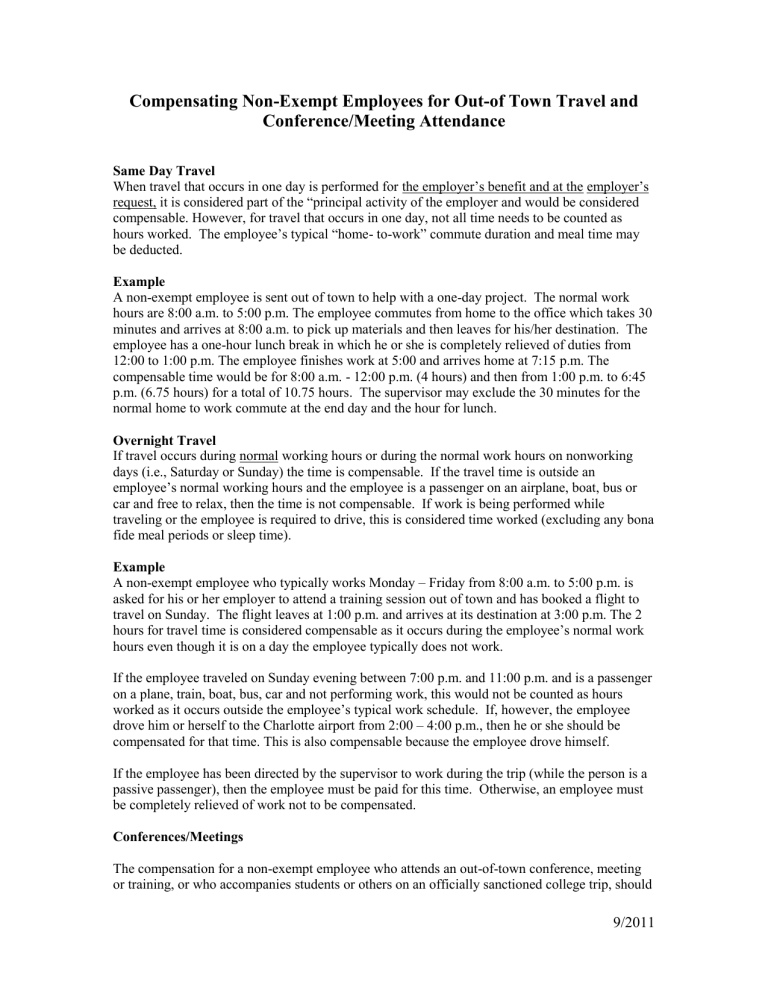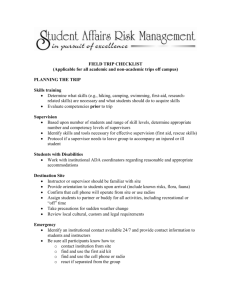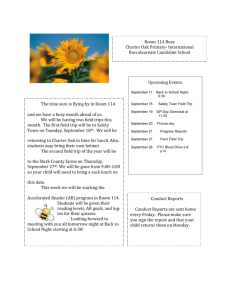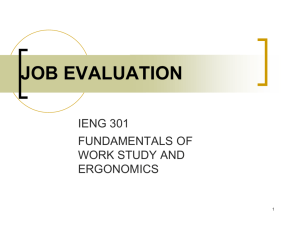Compensating Non-Exempt Employees for Out

Compensating Non-Exempt Employees for Out-of Town Travel and
Conference/Meeting Attendance
Same Day Travel
When travel that occurs in one day is performed for the employer’s benefit and at the employer’s request, it is considered part of the “principal activity of the employer and would be considered compensable. However, for travel that occurs in one day, not all time needs to be counted as hours worked. The employee’s typical “home- to-work” commute duration and meal time may be deducted.
Example
A non-exempt employee is sent out of town to help with a one-day project. The normal work hours are 8:00 a.m. to 5:00 p.m. The employee commutes from home to the office which takes 30 minutes and arrives at 8:00 a.m. to pick up materials and then leaves for his/her destination. The employee has a one-hour lunch break in which he or she is completely relieved of duties from
12:00 to 1:00 p.m. The employee finishes work at 5:00 and arrives home at 7:15 p.m. The compensable time would be for 8:00 a.m. - 12:00 p.m. (4 hours) and then from 1:00 p.m. to 6:45 p.m. (6.75 hours) for a total of 10.75 hours. The supervisor may exclude the 30 minutes for the normal home to work commute at the end day and the hour for lunch.
Overnight Travel
If travel occurs during normal working hours or during the normal work hours on nonworking days (i.e., Saturday or Sunday) the time is compensable. If the travel time is outside an employee’s normal working hours and the employee is a passenger on an airplane, boat, bus or car and free to relax, then the time is not compensable. If work is being performed while traveling or the employee is required to drive, this is considered time worked (excluding any bona fide meal periods or sleep time).
Example
A non-exempt employee who typically works Monday – Friday from 8:00 a.m. to 5:00 p.m. is asked for his or her employer to attend a training session out of town and has booked a flight to travel on Sunday. The flight leaves at 1:00 p.m. and arrives at its destination at 3:00 p.m. The 2 hours for travel time is considered compensable as it occurs during the employee’s normal work hours even though it is on a day the employee typically does not work.
If the employee traveled on Sunday evening between 7:00 p.m. and 11:00 p.m. and is a passenger on a plane, train, boat, bus, car and not performing work, this would not be counted as hours worked as it occurs outside the employee’s typical work schedule. If, however, the employee drove him or herself to the Charlotte airport from 2:00 – 4:00 p.m., then he or she should be compensated for that time. This is also compensable because the employee drove himself.
If the employee has been directed by the supervisor to work during the trip (while the person is a passive passenger), then the employee must be paid for this time. Otherwise, an employee must be completely relieved of work not to be compensated.
Conferences/Meetings
The compensation for a non-exempt employee who attends an out-of-town conference, meeting or training, or who accompanies students or others on an officially sanctioned college trip, should
9/2011
be reviewed by supervisor and the employee prior to the conference or trip, so that the appropriate payment for hours can be determined in advance. That is, if the employee is not working all of the hours he or she is traveling to (see “Overnight Travel”) or physically at the conference/meeting, then a schedule of work hours to be paid should be determined prior to the trip. For example, if a Monday-Friday 8:00 to 5:00 p.m. catches a plane at 8:00 p.m. (after normal work hours have ended) and arrives at the conference destination by 11:00 p.m., having slept or read on the plane (and not done any work), then the time does not need to be compensated. If the conference begins the next day at 9:00 a.m. and ends at 5:00 p.m., then depending upon whether there was a working lunch or a “lunch on your own,” that day at the conference, the employee should be compensated appropriated for the hours between 9:00 a.m. and 5:00 p.m., not his or her “regular” work schedule of 8:00 a.m. to 5:00 p.m.
Determining compensation for all hour worked when an employee is at a meeting/conference also depends upon what events a supervisor direct the non-exempt employee to attend. For example, many conferences offer evening motivational speakers, city tours and networking dinners, or early-morning 5K runs, which are usually considered extras and not part of the conference proper.
If the employee wishes to attend any of these events, he or she should discuss it with the supervisor prior to conference attendance to if the supervisor wishes to compensate the employee for attending, Per the FLSA guidelines, in order for a conference or training activity not to be counted as compensable working time, the following four criteria must be met:
Attendance must occur outside the employee’s regular work hours;
Attendance must be voluntary on the employee’s part;
The employee must do no productive work while attending the event;
The program, conference, lecture, meeting, event, or trip should not be directly related to the employee’s job
If the supervisor determines that these additional events are not compensable as work time, the employee may of course still attend, but the supervisor does not have to compensate the employee for attending, nor pay for the event itself, should there be an additional cost (such as for a city tour or a show).
In some cases, a non-exempt employee is required, as part of his or her job to accompany students or other on official college trips. Even in such cases, not all hours involved necessarily must be compensated as work time, if the employee will be afforded meal breaks, sleep time, shopping or event attendance not related to the trip, etc. during the trip. Again, the supervisor and employee should discuss the trip ahead of time, review the itinerary, and determine what times the employee will be relieved of duty and thus not compensated. Supervisors should be aware, however, that should emergencies or situation arise in regard to the trip or the travelers on the trip that the keep the employee from taking his or her pre-determined non-compensated sleep, meal or other 30 minute or more breaks, then the employee must be compensated or given another break of equal length during the same trip.
Note to supervisors: Nothing in the federal regulations or guidelines prevents paying an employee for any or all of this time; rather, these guidelines indicate what MUST be paid.
However, supervisors are cautioned that consistency and equitable compensation is key: however one non-exempt employee is paid, all similarly situated employees must be paid comparably/consistently when they travel.
For questions – contact Human Resources at 828-771-2048
9/2011







